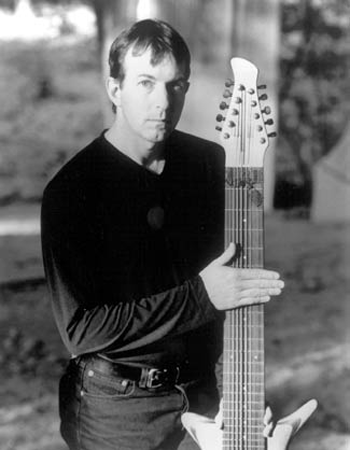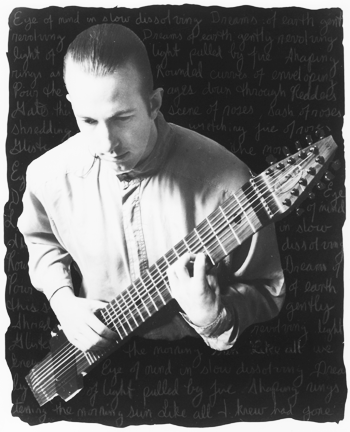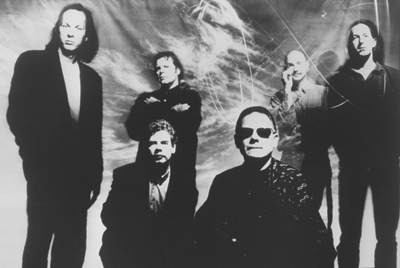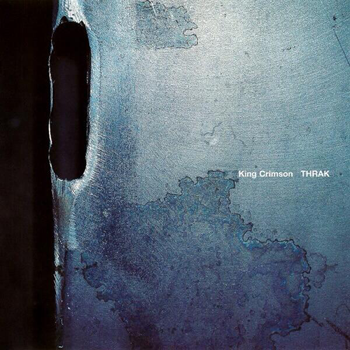
Trey Gunn
Searching the Perimeter
by Anil Prasad
Copyright © 1998 Anil Prasad.

King Crimson may be a legendary prog-rock act, but when most of its members tour in solo mode, they have to face the realities of working within strict budgets to keep the enterprise in the black. That's why Warr guitarist Trey Gunn is conducing this interview at a friend's house, deep in the heart of the Noe Valley district of San Francisco. It's one of many homes Gunn will unwind in during his current tour in support of his recent album The Third Star.
Decked out in a grey sweater, black t-shirt and stubble, Gunn greets Innerviews with a warm, yet weary smile. He offers a gentle handshake that stands in stark contrast to the monster grip he uses when playing his enormous 8-String Warr Guitar—an imposing instrument that's equal parts guitar and bass. Fatigued from an epic drive, it's obvious Gunn could benefit from some shut-eye in the sleeping bag on the floor next to the dining room table where we sit.
The soft-spoken musician provided commentary ranging from the playful to the deadly serious. He's a reflective conversationalist who often pauses mid-thought to search for intriguing anecdotes and examples.
I understand you've faced more than a few frustrating situations in touring as a solo artist.
I thought I had kept it cool and under cover. [laughs] It's going pretty good. I've started pulling together the expenses versus what's coming in. I haven't purposely totaled that yet because I don't want to know. [laughs] Things became easier once the tour started. Before, we had to figure out the tour set-up, rehearsal times, what car to take, the airport schedule, where we're going to get mics, and where the clubs are. Yesterday was an 11-hour drive day, and we have another one tomorrow that's 15 hours. This is my first solo tour, and I don't have a track record for the clubs. A lot of clubs don't know I have a solo record or who King Crimson is. But we've been well received. We haven't sold out a show yet, but we haven't lost any money for club owners either.
Compare touring as a solo artist to being on the road with King Crimson.
The hotels aren't as nice. [laughs] Hotels are a lot of dough, so we share rooms. You know, Crimson hasn't done any live shows for almost two years. A lot has changed in terms of everyone's playing. It's hard to compare. It's almost as if we're in a different era now. Logistically, it's a lot different in that we do everything ourselves—just the four of us in the band. But the more you put into it, the more you get out of it.
What are the challenges of trying to establish yourself as a known commodity in the public eye?
Each new act out there makes the pot bigger, and the guys at the bottom of it aren't trickling off—they're still there. The amount of music available to hear and know about is overwhelming. Generations of fans cycle every seven years, or even less now, and they don't even know anything about Crimson, which makes it harder in a way. But in another way, it's nice because there are potentially fresh people to listen. For example, it was fantastic for Crimson to play the H.O.R.D.E. festival because there were people there who would never ever come to a Crimson show. Yet they were forced to endure it. [laughs] It's a real shocking musical meal for people to be there in the middle of "Thrak" who would never bump into Crimson otherwise. And that's the thing for me. Playing for Crimson fans is another thing in that you can do that anywhere in the world, and really, you're just dealing with how you play to or against or with people's expectations. But when people have no idea what's going to happen—that's really exciting. That's an interesting thing about this tour too. Crimson fans aren't even sure of what to expect or what I do.
Describe your role in the current King Crimson line-up.
This Crimson is a very different band than Crimsons of the past. It's an ensemble playing kind of band, at least to date. So far, the shows and records are not about showcase playing. Granted, we do play some of the earlier repertoire with solos from other players, but not me. I like ensemble playing because it's really challenging in a different kind of way. We weren't sure what the point of the double trio was and how it fits together is the thing for the new band, not "How do I define myself?" which is what the '80s band was about. This Crimson is a context in which Adrian Belew can discover a new vocal thing in which a Stick will work, or Bill Bruford can do his thing. My role is a very strange and unknown role in rock. It's a very fickle role—it's moving from role to role, whether it's bass or guitar or textures or sound effects. It's a funny role. Plus, I was mixed too low at the shows. [laughs] Not all the time, but sometimes I was.

Why were you mixed so low on the Thrak and Thrak Attak tours?
What do you do with all that sound? On record you can place things. You can pan the basses, you can put the guitars and bass drums in one place. But live, you're dealing with a cavernous space where often the sound is really shitty to begin with and is really hard to figure out. Sometimes you can't hear Robert Fripp either.
Do you feel you've received the recognition you deserve for your work with the band?
It's something that's going to take time. Crimson is a thing that may or may not continue. I've been playing music for 31 years, and I'm not going to stop now. There's never been any explosion of public recognition—it's been a slow, churning thing. It would be great to be a famous musician on the cover of Guitar Player magazine, and maybe that will happen someday. But the course to get there is a very long and slow process. It takes a lot of work and it's not the kind of thing I do. It has nothing to do with music, but with record sales and entertainment value. Crimson has neither.
You don't believe King Crimson has entertainment value?
No, not really. If you have King Crimson on the cover of a magazine, will you sell more magazines? No. Maybe an exclusive interview with Robert would be something, but that's not going to happen. Is having Crimson on the cover of Guitar Player as good as having Everclear's guitarist on it? Entertainment value is a different thing from being a musician or playing music.
How have The Third Star pieces evolved in the live arena?
I heard Third Star the other day for the first time in a long time and it was interesting to hear how clear the mixes are and how good it was. My band is playing five tunes from it, and we're using the recording as a sketch of a tune for what we do with it live. We've changed things arrangement-wise. They're certainly much livelier and more juiced with energy. The stuff was never performed before it was recorded. They were studio conceptions. There's a lot of cueing in the live versions—the structure is really loose. We've mutated the music.
What surprised me about The Third Star was the funk element you introduced to some of the tracks.
There's a lot more of it live too. Santana once called Robert "The whitest guitarist on the planet." [laughs] I think it's probably true. I grew up with funk and those guys in Crimson didn't. I grew up with K.C. and the Sunshine Band and The James Gang. Pat Mastelotto did too. Bruford is a great drummer with great time, but he's far from funk, and he's been in the band forever. It's a different form.
Did the pieces on The Third Star evolve from improvisation or composition?
A little bit of both. A few pieces are very formulated in terms of structure and I didn't do any editing of the pieces after were they were laid down. Some are very improvised like the tune "Arrakis" in which Bob Muller and I initially recorded the percussion, then took my parts out and used sounds from an open drumkit with no high hat, cymbals or snare. We then used an Egyptian snare you play with your hands and further built up the rhythm track. Then I improvised the bass on top of it. Also, I mailed DATs back and forth to Pat until we got what we liked. We never did it live. The tune with Alice was the same. We never worked together and just sent tapes back and forth. So, I did a little bit of everything for the album.
You chose not to sing on The Third Star. How has your perspective on your voice changed since your last album?
It doesn't convince me right now. I can listen to earlier recordings where it does convince me, but that's not where my interest is now. I have a real interest in the female voice. The male voice is not as interesting to me unless it's David Sylvian. Adrian is a great singer, but for my solo work, I was more interested in developing the instrumental side—the droning, groove stuff, playing the melody, and not having it sound like half-baked jazz.
Describe The Third Star's concept from the overall theme to packaging.
There was quite a bit of searching around the perimeter. I suppose the thing that started to make it gel was when I had written the backing track of "Third Star" and sent it off to Alice. At the time, I said "Have a go and write a vocal line to this. Do anything you want, just make sure it's in Italian." I had the idea for the title. The Third Star is when the Sabbath begins on Friday night in the Jewish Tradition. Alice said she had already been working with lyrics in a similar vein and she wanted to go with that. That's how the whole thing started to come together. Also, I had been living in New Mexico for two years and spent a lot of time exploring the sky and that became a theme for it.

How were you exploring the sky?
It was amateur astronomy stuff. In New Mexico, the sky is unavoidable. So, I spent a lot of time looking at the stars and figuring out what star was what, and really learning about the sky and our little home, the Milky Way.
Your first solo album, One Thousand Years, was recorded before you started working with King Crimson. How did your experiences with the band affect the direction of The Third Star?
I was willing to take more chances. King Crimson has a go-for-it attitude. I don't think I took any of the King Crimson ideas and used them, but it doesn't sound unlike someone who plays in King Crimson. It has the King Crimson attitude in that Robert encourages us to come up with things off the deep end and rather than retreat, go full force into that place. I guess that's chained to the record.
Do you still feel like the new guy in King Crimson?
I don't feel as new, but I am the youngest guy. You never make any assumptions with King Crimson. For all I know, it's already over and I think everybody else has been through it enough that there's no telling what's going to happen. Tony Levin is going to go out on tour with Seal, and then Peter Gabriel. So, you can make a vague sketch, but that's it. But things seem to have worked out so far, and we're kind of going forward in the middle of this Projekct Two stuff we're doing. The idea is to bring new ideas to the next King Crimson through Projekct Two.
Bill Bruford told me that King Crimson had enough material for a new record more than a year ago, but the band decided to shelve it in favor of fresher ideas. What's your take on that?
It was hard to write with all six guys to get the sound we got on Thrak, which is a great, big, huge sound. A lot of the ideas we wanted to develop are hard to do with six guys. The kind of stuff that could still come out is still there, but we want to expand into more radical territory as well. We would also like to play no old material for the next tour. I don't know how people will take that, but we don't really care. There has been such a history to the band—which is great, because you can access the entire history, but it also gives the audience what they want. [laughs] I haven't had to deal with that as much because I haven't been doing this long enough to have something that hangs on you. But these guys have.
Speaking of old material, I was surprised the band added "21st Century Schizoid Man" to the setlist on the Thrak Attak tour.
Yeah, and we stopped playing it too. [laughs] It was pretty cool actually. It was fun. We could play it really well and do neat things in the solo sections. We would also really be split up into two rhythm sections, but the song didn't work in a lot of the places we were playing it. It seemed too heavy for the outdoor shows. Sometimes in Europe, it would undermine the whole show. We played it in Poland and it seemed like that's all they wanted to hear. The band had never been to Poland before. The audience was so unbelievably excited that they destroyed the merchandise stand where the California Guitar Trio were trying to sell their CDs. You have to wonder if they can even listen in that kind of excitement. So, it's in the repertoire and we can do it. But we dropped it once we came back to America.
How do you look back at Thrak?
I haven't heard it in a long time, so it's hard to say. I prefer some of the performances on Vrooom, like the title track and "Sex, Sleep, Eat, Drink, Dream." They're a lot slower and have a heavier sound. We don't play them at that tempo anymore—they were recorded before the pieces were ever performed live. I really enjoy the "Thrak" on Vrooom. Apart from Adrian's vocals, we recorded it with no overdubs. We joke that the "Thrak" on the record Thrak is the kinder, gentler "Thrak" because it's a little bit sweeter and not very long at all.

Prior to recording Thrak, you told me there was "a need for Crimson to make its commentary on the times." However, Thrak turned out to be more retro-leaning than forward-looking.
There's certainly more of an affinity with '73 Crimson than the '80s Crimson on it, even though the whole '80s band is in this band. I don't think we play the Discipline pieces that well. According to Robert, we play "Larks' Tongue" better than it has ever been played. And "Red" sounds better than the '80s version. But a lot of the Discipline pieces don't sound as good to me as the original four-piece band. Those pieces are still exciting live, but when you put the magnifying glass on it, they don't sound that great. It's just not what this six-piece does really well. That '80s band was kind of an assault, but it was a really clean assault. [laughs] If you can believe this, there wasn't that much going on, which I know sounds strange. But you can hear what's going on very clearly. But this current band is like a whole orchestra. In a way it's subtler and richer. The other thing is that Crimson is such a particular taste—and I'm not talking about the audience. The music is such that it's always going to be backward-looking in a certain way. You can't really compare it to anything else. It just has a tangy flavor all its own.
Tony Levin said he remains uncomfortable with the idea of having two Stick and bass players in the band. How do you feel?
Yeah, I would agree with that. The whole thing is uncomfortable. It's uncomfortable for all of us. [laughs] That doesn't mean it's not worth doing. But yeah, I would say everyone has an uncomfortable-ness with the band. That's part of what it is I think. You can't do something new unless you're put in an uncomfortable position because where you're comfortable is where you've already been. This double-trio makes it sonically complicated to find workable solutions and we have. But that didn't come without a lot of stress and pain. You just can't improvise with two guys in the low end in a concert hall—you can't do it. It's a constricting structure and that's uncomfortable. But I would say this is very ideal because it is challenging.
Describe the impetus for Projekct One and Two, the improv-based King Crimson offshoots you're also currently working with.
Robert has been talking about doing these things for a long time and as usual, no-one really got it for a long time. A year or two ago, Bill and Robert talked about doing some improvised nights in London—just the two of them. So, they decided they were going to do it, and then Bill said "Well, let's get Tony to come down—it'll be a more exciting thing." Then Robert said "Well, let's get Trey to come down, it'll be an even more exciting thing." And they just booked the shows and that's how it came up. Before we did those shows, Robert, Adrian and I had been writing periodically every couple of month's at Adrian's house. We talked about doing some shows as a three-guitar trio as a fun little thing to do. We were also trying to develop new ideas and throw out other ones. The last time we met, Adrian happened to get the Roland V-Drum sent to him a few days before. We kind of set-up around Adrian's V-Drum—a Roland electronic drumkit which is much cooler than that description sounds. By the end of two days, we had eight hours worth of stuff—just live, six-track material with each of us on two-tracks. It was great, crazy stuff. We just went for it and didn't look back. We got so excited that we mixed it then and there. Robert was so excited about it that he put it into the DGM catalog as soon as it could be released. We've got a heck of a record. We decided to do a double CD because things were falling into two separate areas. Some of it is really hilarious lounge music like you might hear on the Star Wars spaceship. One disc is called Space Grooves and the other is Vector Patrol. Now, Robert, Pat and I are working on a record, and we're talking about doing a trio as well. The idea just seemed to grab everyone—to break up the six-piece and see what we come up with, and then bring those pieces back together.
Earlier, you discussed the expectations of playing for the King Crimson fan base. But the fact that Projekct Two is playing two hours of improvised music to sold-out houses must be a positive reflection of an element of the audience.
Oh yeah, definitely. There are people out there who are tweaked if the music isn't radical enough. I suppose that's the difficulty with the King Crimson fan base. The band has such a varied history that you can pretty much offend everyone in a show somehow for not being something or being too much of something.
In your Projekct One tour diary, you said "Experience seems to weigh you down as much as it is an asset." Elaborate on that.
It's only when you've gone through your book of tricks that you get to the new fresh world. It took us the first two-and-a-half nights with Projekct One to get there. The last night we were empty of all our ideas, so things went further. In that way, experience gets you there and makes you deliver a professional, satisfying show regardless of whether it's fresh to you or not—at the price of innocence. What we're shooting for is the point where no matter how much experience you have, you're still in tune with the newness of it. That's the way free improvisation should be.